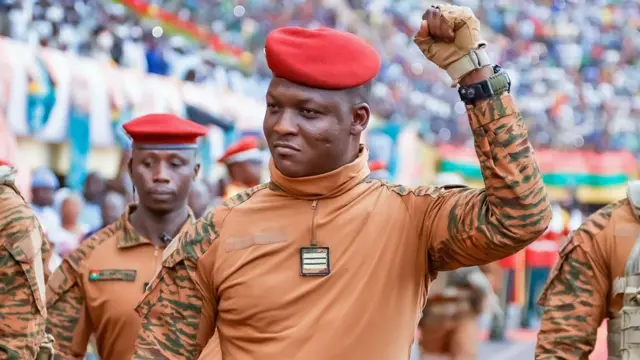Burkina Faso’s Capt Ibrahim Traoré: A Rising Pan-Africanist Icon
At just 37, Captain Ibrahim Traoré has emerged as a dynamic figure in Burkina Faso, adopting a charismatic stance as the country’s military leader. He advocates for a form of governance that resonates deeply with many Africans, positioning himself as a pan-Africanist champion eager to liberate his nation from what he perceives as Western imperialism and neo-colonial influences.
Supporters of Traoré liken him to legendary figures such as Thomas Sankara, the late revolutionary leader of Burkina Faso, who is often dubbed “Africa’s Che Guevara.” According to Beverly Ochieng, a senior researcher at Control Risks, Traoré’s ideological appeal has reached enthusiastic audiences even in countries like Kenya, where political and intellectual circles express admiration for his vision. “His messages reflect the age we are living in, when many Africans are questioning the relationship with the West,” Ochieng stated.
Shifts in Alliances and Policies
Since taking power in a coup in 2022, Traoré has redirected Burkina Faso’s foreign alliances, distancing the country from France and cultivating stronger ties with Russia. Under his leadership, Burkina Faso has adopted leftist economic reforms, which include establishing a state-owned mining firm and negotiating stakes in foreign mining operations.
| Policy | Description |
|---|---|
| Mining Policy | Requires foreign firms to grant a 15% stake in local operations, and mandates skills transfer to local populations. |
| Nationalization | The junta has nationalized two gold mines and is planning further acquisitions of foreign-owned mines. |
| Social Impact | Efforts include the establishment of a gold refinery and national reserves to secure the nation’s mineral wealth. |
Emerging Popularity and Criticism
Traoré’s popularity has surged across Africa, bolstered by an aggressive social media campaign that some believe spread misleading information about his leadership. Despite his radical reforms, some critics point out that he has not yet resolved the Islamist insurgency threatening national security.
His innovative communication style gained traction after his memorable address at the Russia-Africa summit in 2023. Traoré called upon fellow African leaders to cease their complicity with Western powers, a sentiment that resonated widely among those disillusioned with traditional governance. As noted by Rinaldo Depagne from the International Crisis Group, Traoré’s vision combines elements from past influential leaders, making him particularly appealing to young people in a nation where the median age is only 17.7 years.
International Relations and Future Prospects
While the International Monetary Fund (IMF) and World Bank recognized some of Traoré’s economic strides, relations with the West remain strained. U.S. officials have expressed skepticism regarding his governance, suggesting that Russian alliances could endanger Burkina Faso’s autonomy rather than enhance it. Traoré, undeterred, continues to portray a narrative of sovereignty reclaim and robust national identity, appealing to both domestic and international audiences.
As Traoré navigates complex political terrains and inspires widespread support, it remains to be seen how his leadership will reshape Burkina Faso’s future and the broader regional landscape in West Africa.


